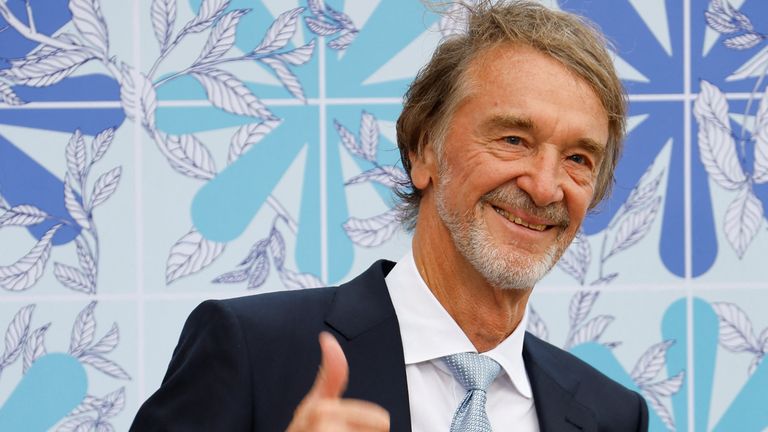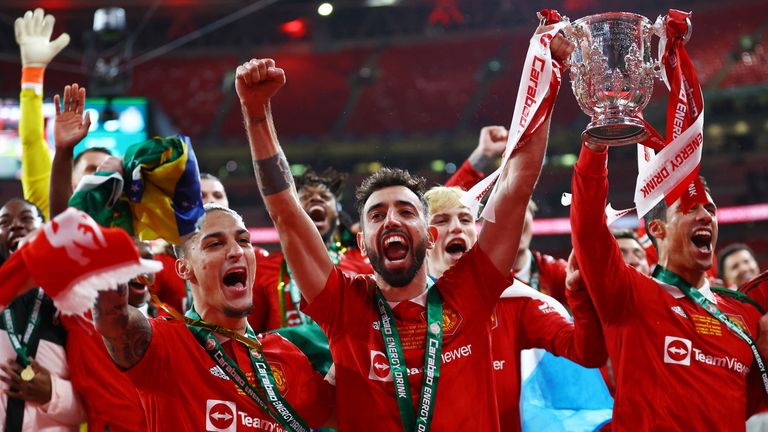The billionaire petrochemicals tycoon Sir Jim Ratcliffe is proposing a full buyout of Manchester United Football Club after three years if he succeeds with a £5bn offer to take control of the Old Trafford outfit.
Sky News has learnt that the Ineos billionaire’s takeover bid includes put-and-call arrangements which would become exercisable in 2026, and which would pave the way for the Glazer family’s complete exit as shareholders.
The disclosure comes just over a week after the Glazers – who have controlled United since 2005 – sought a third round of offers for the club.
Sources said this weekend that Sir Jim’s offer for majority ownership would include the put-and-call options, which if triggered would either force the Glazers to sell their remaining shares to him, or force him to acquire them, at specified future dates.
One insider said the first window to exercise the option would occur three years after the deal completed, with subsequent periods built into the transaction if the first one was not used by either side.
The news may appease some members of United’s fan-base who are implacably opposed to the Glazers retaining an interest in the club they bought for just under £800m in 2005.
The executive co-chairmen, Avram and Joel Glazer, are said to be more reluctant to sell than their siblings, prompting Ineos to structure an offer which would allow them to remain as influential shareholders.
A rival bid, from Sheikh Jassim bin Hamad al-Thani, a Qatari businessman who chairs the Gulf state’s Qatar Islamic Bank, is proposing to buy the entirety of United’s share capital.
Recent reports have suggested that on a valuation basis, Ineos Sport’s offer is higher, although concrete details of the two proposals remain unclear.
Some people involved in the deal expect a decision about a preferred bidder to be made this month.
Later in May, the Red Devils will play in the FA Cup Final against neighbours, Manchester City, while they recently secured their first trophy for six years by beating Newcastle United in the Carabao Cup Final.
In addition to the two proposals which would trigger a change of control, the Glazers have also received at least four credible offers for minority stakes or financing investment in the club.
These include an offer from the giant American financial investor Carlyle, revealed by Sky News last month.
Other financial investors have shown interest in becoming minority investors by providing capital to allow United to revamp the ageing infrastructure of its Old Trafford home and Carrington training ground.
Those which have lodged minority investment proposals with Raine include Elliott Management, the American hedge fund which until recently owned AC Milan; Ares Management Corporation, a US-based alternative investment group; and Sixth Street, which recently bought a 25% stake in the long-term La Liga broadcasting rights to FC Barcelona.
Sky News exclusively revealed last November the Glazer family’s plan to explore a strategic review of the club its members have controlled since 2005, kicking off a five month battle to buy it.
The Raine Group, the merchant bank handling the sale, also oversaw last year’s £2.5bn takeover of Chelsea by a consortium led by Todd Boehly and Clearlake Capital.
At a valuation of £5bn – below the Glazers’ rumoured asking price – a sale of Manchester United would become the biggest sports club deal in history.
It would eclipse even the $6bn (£4.8bn) takeover of the Washington Commanders NFL team agreed last month by Josh Harris, an American private equity billionaire.
Part of the justification for such a valuation resides in potential future control of the club’s lucrative broadcast rights, according to bankers, alongside a belief that arguably the world’s most famous sports brand can be commercially exploited more effectively.
United’s New York-listed shares have gyrated wildly in recent weeks amid mixed views about whether a sale of the club is likely.
On Friday, they closed down at $19.07, giving the club a market valuation of just over $3.1bn.
Manchester United’s largest fans’ group, the Manchester United Supporters Trust, has called for the conclusion of the auction “without further delay”.
“When it was announced in November that the Glazers were undertaking a ‘strategic review’ and inviting offers to buy the club, MUST welcomed the news and went on to urge the majority owners to move ahead with the process with speed, so that any period of uncertainty was as short as possible”, it said in a statement last month.
The Glazers’ 18-year tenure has been dogged by controversy and protests, with the lack of a Premier League title since Sir Alex Ferguson’s retirement as manager in 2013 fuelling fans’ anger at the debt-fuelled nature of their takeover.
Fury at its participation in the ill-fated European Super League crystallised supporters’ desire for new owners to replace the Glazers, although a sale to state-affiliated Middle Eastern investors would – like Newcastle United’s Saudi-led takeover – not be without controversy.
Confirming the launch of the strategic review in November, Avram and Joel Glazer said: “The strength of Manchester United rests on the passion and loyalty of our global community of 1.1bn fans and followers.
“We will evaluate all options to ensure that we best serve our fans and that Manchester United maximizes the significant growth opportunities available to the club today and in the future.”
The Glazers listed a minority stake in the company in New York in 2012 but retained overwhelming control through a dual-class share structure which means they hold almost all voting rights.
For the last two years, the club has been promising to introduce a modestly sized supporter ownership scheme that would give fans shares with the same structure of voting rights as the Glazers.
The initiative has, however, yet to be launched despite a pledge to have it operational by the start of the 2021-22 season.
“Love United, Hate Glazers” has become a familiar refrain during their tenure, with supporters critical of a perceived lack of investment in the club, even as the owners have taken huge dividends as a result of its continued commercial success.
A spokesman for Ineos’s bid declined to comment.


